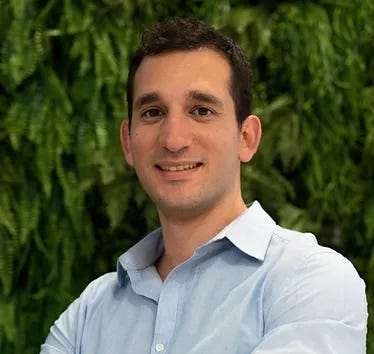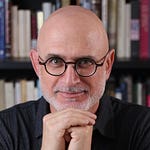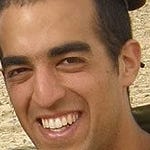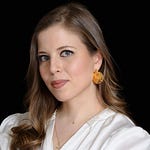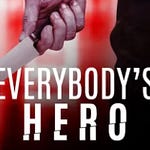A long, long time ago, in a land before judicial reform, we used to speak about other things, too.
Several months ago, in January, we interviewed Tomer Swisa, a graduate of Shalem College, about a fascinating new project in which he is involved. Alas, judicial reform took over the airwaves, and our conversation with Tomer has been waiting for a respite in the news for us to share it with you.
Tomer’s story is a fascinating one. A former commando in Sayeret Matkal (Israel’s foremost commando unit), Tomer was finishing up his degree at Shalem, when he had occasion to meet Elad Shamir (former PM Yitzchak Shamir’s grandson). Shamir told told Tomer that he was starting the Kinneret Innovation Center (KIC), and asked him to join.
The challenge appealed to Tomer. A majority of Israeli startups are based in the larger Tel Aviv area, which means that talented people who come from places like Beit Shean, Tiberius, Kiryat Shmona, Eilat and elsewhere are often overlooked. The purpose of the Kinneret Innovation Center (KIC) would be to tap into the Jordan Valley’s strength and know-how in agriculture and to build infrastructure so that the next agri-tech, water-tech, or climate-tech solutions could come from there. KIC would also help Israelis living outside of central Israel find jobs in the tech sector, enabling them to stay in northern Israel and end the “brain drain” to Tel Aviv.
KIC was founded in 2018, and since then, has become a leading innovation hub for agricultural tech.
In addition to all its tech facilities, KIC is also opening a visitor center — many people ask us what they might see on their summer trip to Israel that they haven’t seen before. Places like KIC are off the beaten track, but they’re a window into an important segment of Israel’s economy and its contribution to the world and humanity. And Tomer’s story will give you a sense of the fascinating journeys on which many young, talented Israelis embark.
If you’re headed to Israel this summer, check it out!!!
We’re making this full podcast available to everyone. The link above will take you to the full recording of our conversation; below is a transcript for those who prefer to read.
In recent weeks, quite understandably, we have been spending a lot of time thinking about political issues in Israel. The truth is that Israel from the Inside was meant not to be political. It was meant to deal with some politics, but some history, some culture, music, literature, fascinating people, Jews, Arabs, religious, secular, young, old, native, immigrants to try to give a full impression of the real mosaic of people and projects and ideas that make up Israel.
But it's the nature of the beast that given Israel's most recent elections and more importantly, the emerging coalition from those elections that we spent a considerable amount of time talking about some political issues, talking about the Negev and the problems of the Bedouin and the Negev. We interviewed one organization that's really working very hard to try to, quote unquote, take back the Negev. And we also interviewed someone from another organization who feels that the best way to fix the Negev is to reach out and give the Bedouin more opportunity. So, we see very, very different responses to very similar problems and we want to take some time now and begin to look at other sides of Israel that we've always talked about. But we've taken a little bit of a kind of a side turn away from everybody talks about Israel as the Startup Nation. Saul Singer and Dan Senor wrote a book called Startup Nation, which is what gave the phrase such panache and everybody knows it. But even the book aside and it's a fabulous book, and they actually have another book coming out relatively soon, even aside from their book called Startup Nation, we all take tremendous kind of pride, amazement, wonderment in this technological marvel that Israel is. But of course, talking about Israel as a startup nation is a big catchphrase for thousands of projects. There's not one project that made Israel into a startup nation. There are thousands, maybe tens or hundreds of thousands of projects of all different sizes that made that happen.
That's what happened in the past. But what's happening in the future? What's being done now to perpetuate, to expand, to deepen this nature of Israel and to have a conversation about one particularly fascinating project that I'm willing to go out on a limb and guess that exactly zero of our listeners are familiar with. I've invited a friend, a former student here at Shalem College named Tomer Swisa, who is doing some really interesting work in one of these projects to sit and talk, and to learn about his work. So, first and foremost, Tomer, thank you for coming to Jerusalem to have this conversation.
Thank you. So nice to be here. Pleasure. Big pleasure.
And before we get to talk about the project that you're working on, tell us a little bit about your background.
Thank you. So, I grew up in Pardesiya, not so far from Netanya. Then I think my interest in Israeli society started when I accomplished my mechina leadership academy called Ein Prat.
We've interviewed other people that went to Ein Prat, a little bit outside Jerusalem. And just to give people again, some background, these mechinot really took off after the Rabin assassination. There were a few before, but it was the Rabin assassination that kind of propelled them. They're all different kinds. There are religious ones, secular ones. But the most interesting ones to me are the ones that mix together religious kids and not religious kids and study a lot of Jewish stuff and Western stuff. And kind of the grand dame of all of these programs is the one that you went to, Ein Prat, which was founded by Micha Goodman, subsequently run by Erez Eshel. So, you went there.
Thank you. This is where I found I want to take a little bit more responsibility in my life. And then, long story short, I found myself in Sayeret Matkal.
Sayeret Matkal is really kind of the preeminent, the premier commando unit in the Israeli army.
Now, with the important milestone that I had there, I was exposed to a speech given by Hassan Nasrallah that he gave about the eight reasons why he sees Israel bringing its own destruction.
I assume the speech that you heard from Nasrallah was not in person…
Ha, no.
Okay. He gave some speech in Arabic, and you either understood the Arabic or was translated.
I needed to translate it. And while I do it I see little things, and I am asking myself, wait, where am I as Israeli, 20 years old, what role am I taking in the future of Israel? At that moment, I made a promise to myself that every career milestone I'm going to take, I need to explain myself how it's going to bring to a better and stronger Israel. And when I finished my military service, a friend from my unit said to me, “Hey, Tomer, we're looking for some responsible guy that can run our farm. Are you willing to work in agriculture?” And I said, “I don't know much about agriculture, but let's go”. I met his father, and his father showed me a bell pepper and asked me, “Tomer, what is this?” and I told him, “This is a bell pepper”. He told me, “No, this is money. If you understood that, you could stop working.” I understood that, and I started working and then I finished there. It was a beautiful time.
How long had you been there?
A year.
Doing what exactly?
I managed the farm, the capsicum and the dates. I had 30 workers working all day long. It was beautiful and one of the things that people usually don't know is that the Arava, it's only 6% of Israel’s land size. It's one of the big producers of bell peppers around the world. Europe is third after Netherlands in Spain.
The Arava is again that strip of desert area or arable land near the Negev on the eastern side of the Negev.
Big miracle. And afterward, I like any other Israeli that wanted to explore the world, I wanted also to take a trip. But I found that you can take it on a different angle. I saw the Jewish Agency promoting their programs to become a shaliach (messenger or ambassador) of a Jewish federation somewhere around the world. And I said, well, that could be a great idea. I could explore somewhere around the world, but also do something positive to Israel. And this is how I found myself in Peoria, Illinois. The heart of Illinois. It was a big pleasure and I think, for the first time as an Israeli born to a Moroccan family and Iraqi family, to meet Jewish peoplehood. It was an amazing opportunity.
Is that really true? Like growing up in Israel, I mean, part of your family is from Morocco. Part of your family is from Iraq. You are the paradigmatic example of the in gathering of the exiles. You didn't really have a sense of a notion of Jewish peoplehood until you went to Peoria, Illinois?
Surprisingly, I had no sense, really. I didn't understand what when we speak about a Jewish state, I didn't understand what exactly does it mean?
I just want to point that out. I want to kind of make a note on the side for the people that are listening, because they often ask themselves, well, why don't Israelis kind of get how important this relationship is here? And here's a guy, he eventually goes to Shalem College, which I work at, an exceptionally bright student. He was in the most elite commando unit that the Israeli army has. He's partly from Moroccan parentage, partly from Iraqi parentage. I mean, the combination of Zionist credentials and people from all over the world, you would think this is a guy who clearly has to understand that there's this notion of Jewish peoplehood out there that's critically important. That's part of what the state of Israel is about. And you're hearing him say it actually never crossed his mind until he went on this Jewish Agency program and got sent for one year to Peoria, Illinois. Okay, so it's just important for people to understand how far removed the idea of Jewish peoplehood is from the day-to-day experience and mindset of typical Israelis. It's just hard for American Jews to wrap their arms around that because it's such a central idea in American Judaism, as you know. It's not a central idea in Israeli Judaism, which I personally, in my view, not yours is a huge failure of Israeli education. But anyway, we're here for you, not me. So, you're in Illinois. What do you do in Peoria for a year? You worked with the Federation, I’m guessing…
With the Federation, also with churches. It was just after Operation Protective Edge, so it was also a very sensitive period of time. But working also with campuses, beautiful time, I learned a lot. And then I came back, and I felt that, again, maybe I had some very amazing experiences, but I don't know much. And at that moment I said, I need to go and go to university. And this is where I found Shalem, I think the best investment I did in my life. It’s a paradise for curious people.
That's a great phrase. We should use it actually.
And after two years or so into the degree, I thought to myself, okay, what's next? What's next? What exactly am I looking for? And I was very lucky to meet a businessperson named Adi Rosenfeld, he exposed me to different people around the world. And that person in one dinner, I was very fortunate that he introduced me to a guy, his name is Elad Shamir. And Elad started to introduce himself, and he was speaking about Israel and spoke about what was important to him. And then some other folks start to introduce himself. Meanwhile, I'm looking to Elad, to his eyes, and I'm telling him, Elad, I know I'm young, I know that maybe we're born on the opposite side of the tracks, but from the way you introduce yourself, I think that both of us want to do something good to Israel. And if you do something, I want to do something great together. He looked at me, he had like, an odd look, but then after six months, he called and said “Tomer, I love the way you introduce yourself. I love the enthusiasm. We are starting something; it's going to be called the Kinneret Innovation Center. It's up in the Jordan Valley if you're up to it, come and join. So, I did.
You were still finishing up the degree?
I was still finishing the degree, but toward the end of the degree, I start commuting until I was just relocating myself from Jerusalem to the Jordan Valley to a small little kibbutz called Ashdot Yaakov.
Which is fairly far north.
Just to give people a little bit of a sense of the geography. The Jordan River Valley, obviously, is the eastern edge of Israel, and it extends more or less from the Dead Sea at the bottom to the Kinneret or Sea of Galilee at the top. And Ashdot Yaakov is where, relative to the Sea of Galilee?
Just seven minutes from Sea of Galilee to its most south point, probably familiar with Deganya and Afikim and those kibbutzim. So just that zone.
Okay, so you go there, and what's this project that he wanted you to work on? It wasn’t bell peppers, right?
No, but look, Steve Jobs said about connecting the dots, it's beautiful. Are we just connecting the dots? I think it's the best combination of Zionism and business together. You mentioned before, speaking about Israel as a startup nation, do you know how many startups there are in Israel?
Actually, I don't know.
It's about 7,200 startups. 7,200 startups. But when you are zooming in, you see that most of them are cyber and fintech. When you are zooming in even a little bit more, you see that most of the startups are operating in Tel Aviv or outside in Tel Aviv…
What percentage of them, for example, are based in the larger Tel Aviv area?
86%.
86% of the 7,200 startups in Israel are based in some way in the greater metropolitan area called Tel Aviv.
Exactly.
So that's 14% is spread throughout the rest of the entire country.
And then it raises up the question, is it a startup nation or is it a startup city? Because we looked at it just in the beginning of the project. Then I will drill down what exactly the project is. But we saw it and we understood, wait, Tel Aviv doesn't have monopoly on the talent. The next Elon Musk can come from Beit Shean or Tiberius or Kiryat Shmona or Eilat. It doesn't matter where. You just need to give them the wings and they can fly. We need to build infrastructure and what this infrastructure is, we understood that in the Jordan Valley, the best infrastructure will be for the next agritech, watertech, or climate tech solutions.
So those are three different areas that I think Israel is fairly advanced in, right? I mean, watertech, we all know Israel is hugely advanced. Let there be water, which is Yossi Siegel's excellent book about that, but also agritech and climate tech. We'll come back to that. But those are three different areas from the two areas that you mentioned in Tel Aviv, which are mostly cyber and fintech. So, you're talking about now doing something in the Jordan Valley, which is on the other side of the country from Tel Aviv and focusing in these three areas climate, water, and agriculture.
When we first saw this project, we understood that Jordan Valley's strength were knowledge and know how in agriculture and water. When you look back, when we start just establishing the first kibbutz, Deganya, 120 years ago, it was just there, Kinneret courtyard. Where a group of Jews coming from all around the world, working up in the morning at a night, sharing stories or writing poems. We probably know Rachel the Poet, AD Gordon and Berl Katznelson, all the great guys.
All around the world, mostly Eastern Europe though.
Yes, mostly Eastern Europe. And six of them said, “Hey, we have a great idea. Let's build up a community based on socialist ideas where we work and we share our revenues, and we can bring and we can build out a community out of it and more agriculture communities, and we call it kibbutz”. And this is how they founded Deganya. And they said, let's run a pilot. And they went to the first VC back then at the time minister Artur Reuben, and he gave them the money. And also, KKL and JNF.
KKL is the Jewish National Fund.
And together they established the first kibbutz. And whoa, that startup succeeds. And then they start to open the next kibbutz, the Deganya Bet, and then the next kibbutz. Today, there are about 270 kibbutzim. Amazing. And in the Jordan Valley, there are 31 kibbutzim. They have outstanding knowledge in how to grow the banana, for example, that we have in the Jordan Valley. It's not a natural fruit to have in that region, but Israelis were able to have it. And when we see it, we said that the knowledge and the knowhow is there. How can we combine it to bring the next talent, the next startups creating these solutions? And this is what Kinneret Innovation Center is.
So, you have this idea of capitalizing on the talent, the knowledge that's embedded in the Jordan River Valley, people that have not driven up, by the way, it's the 90, I think, is the road there. If you've not driven up the 90, it's much faster to go to on the 6 or to go on the 2. I know that. But if you want to get to the north, really, it's worth driving the 90 during the day. The night is not such a great idea. But you will see kilometer after kilometer after kilometer of banana fields. And Tomer now just told us it's not even a native indigenous plan here. So, it gives you a sense of the tremendous knowledge, expertise, know how, innovation that's gone into that place. So, the idea here for your project is to capitalize on this area to try to build a kind of a high-tech hub in the Jordan River Valley as opposed to being in Tel Aviv. Now, there's a college there, if I'm not mistaken, there's called Kinneret College.
Yes, exactly.
And what's their role in any of this?
So Kinneret College is one of the shareholders in this project. Actually, the founder of this whole project is a brilliant guy named Kalman Kaufman. He's one of Israel's high-tech pioneers. And while being there as a volunteer at the college of its board, he is asking how many of our students actually stay in the region? And surprisingly, 98% are leaving to Tel Aviv. And when he asked again why he discovered it's because there are no high paid job opportunities in the region, then he asks another question where are the jobs? And he found that the biggest employee in the region is an agricultural company called “Tzemach”, which means plant that are sitting 200 meters next to the college. And he asked, are we in any communication with them? And I said no. Now, just for listeners, Kinneret College established around 1964 something like that. And Tzemach is almost 100 years old. And it's a question. Sometimes we're just next to each other.
And we don't talk to each other.
Exactly, and we don’t talk. And then they said, okay, let's open something. Immediately he convinced them. He asked them, hey, maybe we can bring some of the knowledge we have in the academy, expertise in water and energy, gas. Can we do something for you to create the future jobs? What do you need? And they said, actually now after a survey that we did in our region, we understood that if the water price in Israel will change in $0.10, almost the entire Israeli agriculture will collapse.
Because the margins are so slim.
Exactly. Only innovation can bridge that gap. They immediately fell in love in the idea.
Innovation is a kind of a safety net. In other words, we understand that we're very vulnerable because if the price of water goes up, which it could right, it's also centrally determined. But if the price of water goes up, our margins are gone, the whole agricultural thing here falls apart. But if we have a tech basis in this area, then we're not vulnerable to the price of water.
So, they said, let's create something. And they called that baby, the Kinneret Innovation Center. And from the moment that they looked for CEO and they found Elad Shamir, the son of Yair Shamir, former Minister of Agriculture and grandson of Prime Minister Shamir.
Yitzhak Shamir.
Yitzhak Shamir. He took it as a national mission. And we decided that it's not just going to be a regional innovation center, it's going to be one of Israel's most meaningful focal points for agritech, watertech and climatech.
And you started there how long ago?
Four years ago.
And how many people were part of this endeavor when you got started?
Wow, when we just started, we were about five and almost and also seven- eight volunteers. And today 23 people and 50 volunteers that are surrounding us.
And what are you doing all day long? What's this project done in the last four years?
The idea is, when we're saying it sounds just these buzzwords that sometimes I'm tired even to say, but building an ecosystem, building a high-tech scene, but it's really like drying up swamps. But now the swamps are conservatism and saying that yes, we can, we can change the region and the success. Maybe some numbers. Today, after four years we were able to bring four high tech companies to the region.
The high-tech companies that did exist before or did not exist before?
They exist in Tel Aviv.
Okay. And you moved them?
They opened the site. On the Kinneret banks. I think it's the most beautiful office in the area, especially in the winter. You can see the bird migration, there is no other place you can see it…. We created a forum that assembled 76 CEOs of the factories and the most meaningful organizations from a hospital CEO to the packing house CEO and also a poultry factory named “Of Tov”, all of them sit together once a month and are discussing and learning from best practice from one each other. After that we also are able to engage with JNF. We just spoke about them before.
And what is JNF doing for you?
So, they also entered as a shareholder and today with them we are building a high-tech park, four levels, building with up to be the most advanced water laboratories and also a place for more international companies to come and see it and open the doors to the next Elon Musks.
Right. A lot of people hear JNF, and they think of little bar mitzvah certificates that somebody bought you a couple of trees, which is important, I mean the foresting of Israel is hugely important and every now and then we have horrible fires, and we have to do it all over again. So, it's critically important, but it's important for people to know JNF does much more than that and here's an example of them investing in the expansion of the areas of where Israel can have high tech and all of that. Okay, what's next on the agenda?
So, actually when speaking about JNF, JNF is asking themselves what else they can do and they understand that after creating the forest you need also to preserve them, to maintain it and they have also the question and it's the question about climate and how can we prevent fires? And they also understand that the solutions will come from tech. So, all this together comes to build this climate tech center or high-tech park that we sit in. By the way, if any of your listeners will come and stop by. Please be our guests and buy some dates.
I can attest personally that the dates from there are about the best dates you've ever had anywhere. Okay, so you've gone from four to 23 and 50 volunteers. You've brought in four high tech companies. You've got a whole bunch of several dozen startups. JNF is investing. I mean, that's already an unbelievable accomplishment. I don't think you probably would have dreamt that that was possible when you started four years ago. I think that would have been sort of pie in the sky. So, Tomer, we have this whole dream of putting together this high-tech park, this high-tech industry area in the northern Jordan Valley. Give us some examples of a few kinds of things that are being developed in that area that are examples of the successes of this project.
Wow. So, Israel has some great messages to the world, some of the brightest startups that are already there. One day there won't be any more cowboys. Today they're developing a drone that will manage your herd instead of a cowboy, just a drone. You direct them with your tablet or your phone, whatever is easier for you, and take them from point A to B in it. Meanwhile, also going over your fence just to make sure everything is okay, and everything is in top shape.
Does this already exist?
It already exists.
Are people using it?
It is starting a pilot now in the United States, actually. In the west and the south. And there are already startups that can forecast how many fruits and vegetables there are while scanning it with a very smart camera.
So how many fruits and vegetables, let's say, are there in these dunams… Why would I need to know that?
Because some of the problem is food waste. And you want to plan your value chain ahead, how many fruits you're going to send to the packing house, how many fruits from the packing is going to be in the retails. And you want to be a smart farmer. You want to know when the right time to pick it or not to pick it. You don't want just to waste.
And so there's drones that are doing this or how's this thing different?
This is with a very smart camera. Some of it with drone, some of it on the tractor itself, some of it in the four wheelers.
Wow.
The idea is the camera. By the way, you spoke about drone. Did you know there is already a drone that can pick up apples?
Pick apples off the trees?
Absolutely. It’s crazy. It looks like a vacuum cleaner. It looks like something from science fiction. A drone with octopus arms that can pick up apples.
And when is this going to be a real thing?
So, this is already running. It's called Tevel robotics. Please check them out. It is invested by already Japanese agriculture machinery company called Kubota. So, I guess hopefully soon.
Alright so, we're getting rid of cowboys. We're getting rid of food waste. We're getting rid of people that put ladders against apple trees and start climbing up and cutting the apples down. What about water technology?
Wow, water. So, there is already technology, but we are not there yet with the customer behavior. We can already make automation in watering. You don't need to water your farm anymore.
What do you mean you don't need to water?
For example, today there was rain on your watermelon field. So already the watermelon got water from the rain itself. You don't need to open your sprinklers; you don't need to do it.
So, there's computers that calculate how much water came down and how much water you need?
And then they open it- the valve by itself totally automated. Crazy. And it works. The problem is that the farmers are not yet ready because it's too futuristic. So, they prefer to get a recommendation and the application itself tells them “Hey, do you want to open it or not?”
They don't want to give up control.
Not yet. But we can already do it. Science fiction. I wish they will have it with plants at home.
I'm sure there's many more examples but because our time is limited… You have these amazing successes. You have drones that are separating herds, you've got drones that are picking apples off trees, you have sophisticated cameras that are helping predict the productivity of fields, you have completely automated control over water and so on and so forth. This is all unbelievable. There's got to have been failures, right? I mean, nothing like this takes off without some things not going the way you wanted. Can you give us maybe an example of something that you had high hopes for that didn't go the way that you wanted?
So, of course startups are something that takes time. But there was an interesting example of a startup that set in our hub. Amazing entrepreneurs. Their idea was to explore how many mines there are in the land, like Google Under Earth that explores and maps mines. But it didn't work. And after a year or so they decided to pivot their ideas and they said maybe mines are not that interesting, but mapping subsurface utilities is way more interesting because today you want to find…
Where the wires are, where the pipes are, so you don't dig them up.
Exactly. You want to build up a building. You need to get a map from A. You need to get another map from B for Z. Anyhow, today they can produce that map in five seconds in one place. But as soon as they develop that idea from a team of ten people, they just the rocket to 20 and then 50 and almost 100 people. We were too small for them in order to keep them in our area we need to find talent. But we weren't ready enough.
So where did they go?
They went to Herzliya. And it was still a little bit too small. And then they moved to Tel Aviv and it's also now also small for them. And all I'm saying is just in the process of two years, it's that fast. And now they are partially in the Tel Aviv. They also have office in Texas.
They're still an Israeli company, though?
Yes, still an Israeli company.
Okay. But you weren't able in the Jordan River Valley to hold on to them because there weren’t enough human resources. Are the students from Kinneret College starting to stay in the Jordan Valley?
Slowly, but yes. One of the things that we develop in order to encourage them to stay, we open our own in-house computer developing company called KIC Dev giving software solutions to organizations in the region and also international. And we give job to juniors, and we imagine that in four years there won't be any more juniors and there will be relevant talent to the high-tech companies that will be in the region. Then we incubate, actually the next future talent.
It's interesting to think about just in terms of the impact of these high-tech centers on bringing young people into certain areas. Jerusalem has a lot of things going for it, but one of its huge problems is that secular young people have left the city in mass numbers and are continuing to leave the city in mass numbers, which is going to leave the city basically composed of religious Jews and Arabs, which is a huge problem for Jerusalem, which we're not going to get into. And many people hoped that Mobileye, which is an enormous company being situated in Har Hotzim, which is essentially part of Jerusalem, would bring a flock of young people into Jerusalem. And it hasn't worked, actually. They've tried housing issues. They've tried all kinds of other ways of tempting them in, but a lot of these young people would much rather live in Tel Aviv and take the train into Jerusalem. So, the issue of bringing the talent to these areas or keeping the talent in these areas is not only a frustration of the Jordan River Valley it's a problem throughout Israel which is worthy of another conversation.
But this is super helpful to hear about some of the examples of the successes and some of the examples where you were frustrated by not having enough natural talent because clearly, it's a tremendous amount of exciting tech stuff going on there. It's kind of a younger brother, a younger sister to the enormous tech scene that's going on in Tel Aviv. But like siblings, they're not identical. They have different interests, they have different strengths, they have different focuses and so on and so forth. Let's just go back to what you said at the very beginning of the conversation. You were 18 and you went to the mechina and you had an awareness that you wanted to spend your life doing things that would matter for the country. The next thing you did was you went to the army, and you were in Sayeret Matkal, which we said is really kind of the most high-quality commando unit that the army has. Then you went to do agriculture, then you went to Shalem, which is Israel's first liberal arts college with a Zionist bent, without any embarrassment about that whatsoever. Now, you find yourself here. We were just talking about different stages of life, because you and I are each sort of going through momentous changes in our lives and our personal lives at this moment, and we were telling them, talking about the different stages of one life, what would you imagine you would say to grandchildren? I mean, you're much, much too young for that, but what would you want to say to the grandchildren that you, God willing, will eventually have one day as they're sitting on your knee and they're saying, tell us what you did back then in the Jordan River Valley. What do you want to be able to say to them about what the impact of these years of your life is on the Jewish state?
Wow. That we didn't stand aside, that want to be part of creating a better Israel. And it's our responsibility. It was my responsibility. When we speak about Israel today, we are still the founding fathers and mothers of Israel. 70, 80, 90 years. It's still a very short time in history of a state. So, it's us. It's us. I know I'm young, but it's still us.
I just think it's an actually very powerful way to begin to wrap up a conversation, because we're living in an era of cynicism. People are cynical about countries in general, people that are cynical about leaders. People are very often, by the way, cynical about young people who they say just want to stay in their houses and be online and do whatever they're doing. And you're an example of what has always made Israel so extraordinary. You're an example of the kind of worldview that has made Israel what it is. And you're an example, I think, of what's going to make Israel even greater at 150, it is almost at 75, which is to say what needs to be done, what can be done, what my role can be in this? How does this impact the lives of the people around me? How does it impact the lives of the country? How does it impact the life of the world? It's really the embodiment of what Zionism always was and what Zionism still is. And I think that's what's important for people to know is if they go to Tel Aviv and they go to Independence Hall and they see the place where the Declaration of Independence was read out, it's very powerful, it's very moving. I get choked up every time I do it. And I've done it many, many times. It's not a project in the past, it's a project in the future. And you're one of those many hundreds, and thankfully thousands of people, I would say, throughout this country, for whom dedicating one's life to the furtherance and the betterment of this project is a core part of who you are. And that's how you find yourself in the northern part of the Jordan Valley. And that's how you find yourself so excited about the work that you're all doing there. And people should come and check it out. People should come and see that as one of the things that is worth seeing in Israel, in addition to all the other more obvious tourist destinations.
Thank you. Come see cool innovations, robots, everything. Just come and thank you for that.
Is there a visitor center there, by the way?
Yes, and there will be a big visitor center in 2024, when we will also open our high-tech park. But if you're coming before…
Just get in touch with me and I'll get you in touch with him. And where is the visitor center going to be?
Tzemach junction.
So, right near Kibbutz Deganya.
Exactly.
Great. So, I actually haven't seen that, and I look forward to seeing it. I hope many of our listeners will come and see it. For giving us some inspiration in an era in which we all desperately need it and for what you do with your life, thank you very much. It's great to see you again.
Thank you so much. Pleasure to be here.
The Nate Geller Memorial Lecture, in which I’ll be in dialogue with JTA’s editor in chief, Philissa Cramer, will be held on May 18 at 1 pm ET. To sign up for the lecture, which will be on Zoom only, please use this link.
Impossible Takes Longer is now available on Amazon and Barnes & Noble and at other booksellers.
Music credits: Medieval poem by Rabbi Shlomo Ibn Gvirol. Melody and performance by Shaked Jehuda and Eyal Gesundheit. Production by Eyal Gesundheit. To view a video of their performance, see this YouTube:
Our twitter feed is here; feel free to join there, too.



